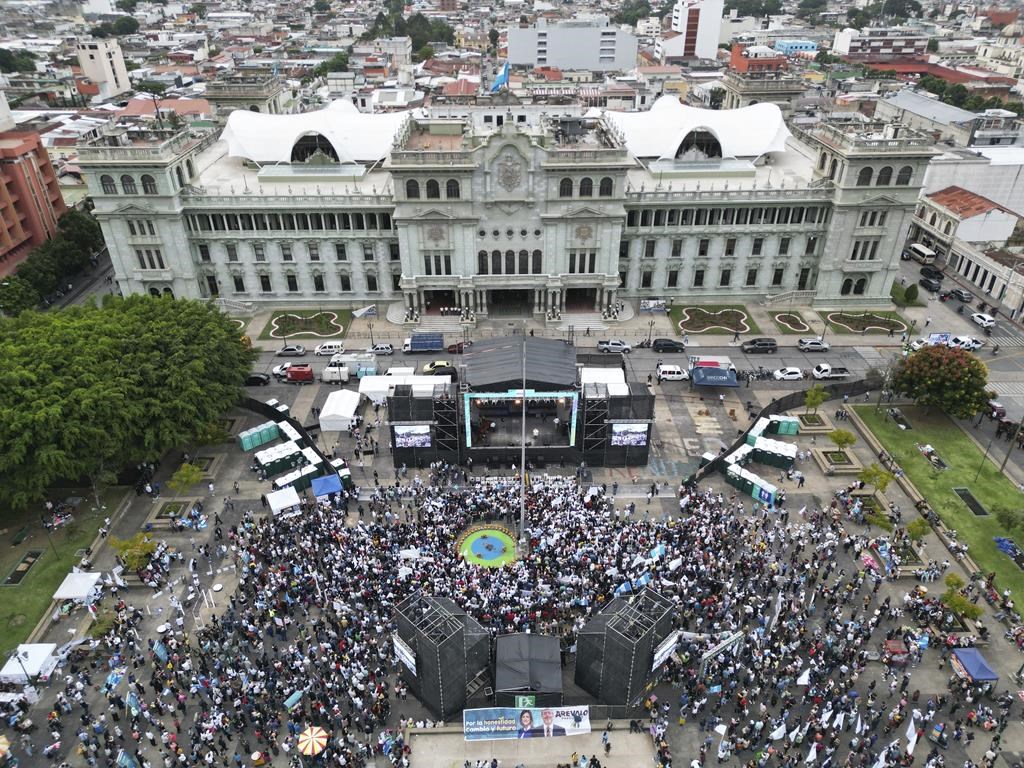Guatemalans to choose between political veteran, surprise outsider in presidential runoff

GUATEMALA CITY (AP) — For much of Guatemala’s troubled electoral campaign, authorities seemed determined to limit voters’ options to a range of presidential hopefuls unlikely to shake up a corrupt political system, keeping several candidates seen as threats off the ballot.
In part, the strategy seemed to work. The man leading polls a month before the first round election in June was kept off the ballot, and three-time candidate and former first lady Sandra Torres, an opponent-turned-ally of outgoing President Alejandro Giammattei, was the lead vote-getter in the vote, sending her to Sunday’s presidential runoff.
But one candidate campaigning against the system had flown so far under the radar that no one paid attention to him until he finished second in the June vote. Now Bernardo Arévalo is facing off against Torres on Sunday with polls suggesting he could very well win.
Advertisement
Arévalo’s success appeared to rattle authorities. Almost immediately, a court ordered a review of precinct vote tallies, the Attorney General’s Office announced an investigation of his Seed Movement party, and a judge briefly suspended the party’s legal status.
Torres launched a blistering second stage campaign painting the lawmaker and son of ex-President Juan José Arévalo as a radical leftist threat to Guatemalan families bent on installing a totalitarian communist regime.
For some voters, it made the choice even clearer. In Torres’ attempts to create an Arévalo bogeyman, she elevated his status as an outsider and threat to a system most Guatemalans are desperate to eradicate.
“What we are wagering Sunday is the survival of our democracy,” said political analyst Marielos Chang, explaining that Guatemala could become like other Central American countries simulating functioning democracy through elections while eroding democratic institutions.
Perceptions among Guatemalans that the country’s political and economic elite are corrupt and in cahoots with organized crime heightened after then-President Jimmy Morales booted a highly successful U.N.-backed anti-corruption mission from Guatemala in 2019.
Advertisement
Since then, Morales’ administration and now Giammattei’s have taken control of the justice system and set the Attorney General’s Office against those who had led the anti-corruption fight. More than two-dozen prosecutors and judges have fled into exile.
The U.S. government has sanctioned the attorney general and her anti-corruption prosecutor for alleged involvement in “significant corruption.”
Opinion polls released in Guatemala this week have showed Arévalo ahead by a wide margin.
At his campaign’s closing event Wednesday night, Arévalo told thousands gathered in the capital’s central square that “just like we said two months ago, they’re not going to see us coming. We’re going to be the surprise and a people who demand their dignity cannot be stopped.”
Edgar Ortiz, the legal director of the Guatemala-based Liberty and Development Foundation, said that according to his group’s polling nearly half of those surveyed had an unfavorable view of Torres. Her attacks on Arévalo haven’t resonated because voters are in the mood to punish traditional parties, Ortiz said.
Advertisement
That is less true among older, poorer voters in rural areas who make up Torres’ most loyal support base. They remember the free bags of food staples they received each month when she was first lady overseeing the country’s social services. And the talk of legalizing same-sex marriage and abortion they’ve heard Torres spread about Arévalo worries them.
Just days before the vote, Dora Hernández was still agonizing over her decision. She was one of those who helped Arévalo make it to the runoff, voting for him in the first round because of his promise to pursue the corrupt.
“With that candidate (Arévalo), Guatemala could be transformed,” she recalled thinking.
More recently though, she had heard Torres saying Arévalo was a threat to Guatemalan families. The wife of an Anglican minister, she does not support same-sex marriage.
“We don’t know if it’s the other party making a big negative campaign with that or if there’s really something to it,” said the 46-year-old homemaker from the town of Gualan in eastern Guatemala.
Advertisement
In the rural area where she lives, everyone is supporting Torres, she said, because they are poor and Torres has promised bags of food and other support. But she harbors doubts about Torres too.
On Tuesday, Guatemala’s largest veterans group endorsed Torres, joining in her description of the Seed Movement as an existential threat to Guatemala’s democracy. The same group similarly drummed up fear over Torres during her first two bids for the presidency.
Cynical reversals like that lead others to dismiss it as political theater.
Javier Zepeda was initially interested in businessman Carlos Piñeda, whose candidacy was ended by the courts barely a month before the first round of voting at a time when polls showed him to be the frontrunner. With Pineda out, the 39-year-old merchant switched to Arévalo, another candidate promising to change the system.
Zepeda said crime and the cost of living had risen while his salary stayed the same. He said his car was recently stolen and the police did nothing after taking his report.
Advertisement
Torres’ attempts to paint Arévalo as a threat to Guatemalan families was just “politics,” he said. He watched the candidates debate this week and seemed satisfied with Arévalo saying he had no intention of making changes that would affect Guatemala’s conservative social values.
Still, Torres is Guatemala’s best-known politician and she has built a formidable network across the country. The wide margin shown in the most recent polls, however, could make it harder for her to activate that network on Sunday.
Chang, the political analyst, asked: “What incentives do mayors from other parties … have to mobilize people and voters for a candidate that the polls tell us is not going to win?”
Christopher Sherman, The Associated Press
Advertisement